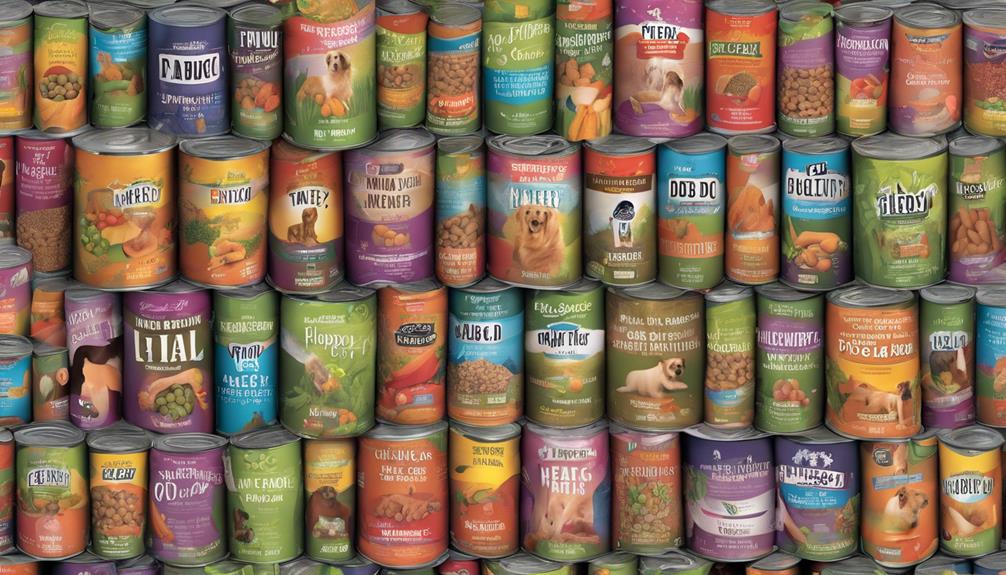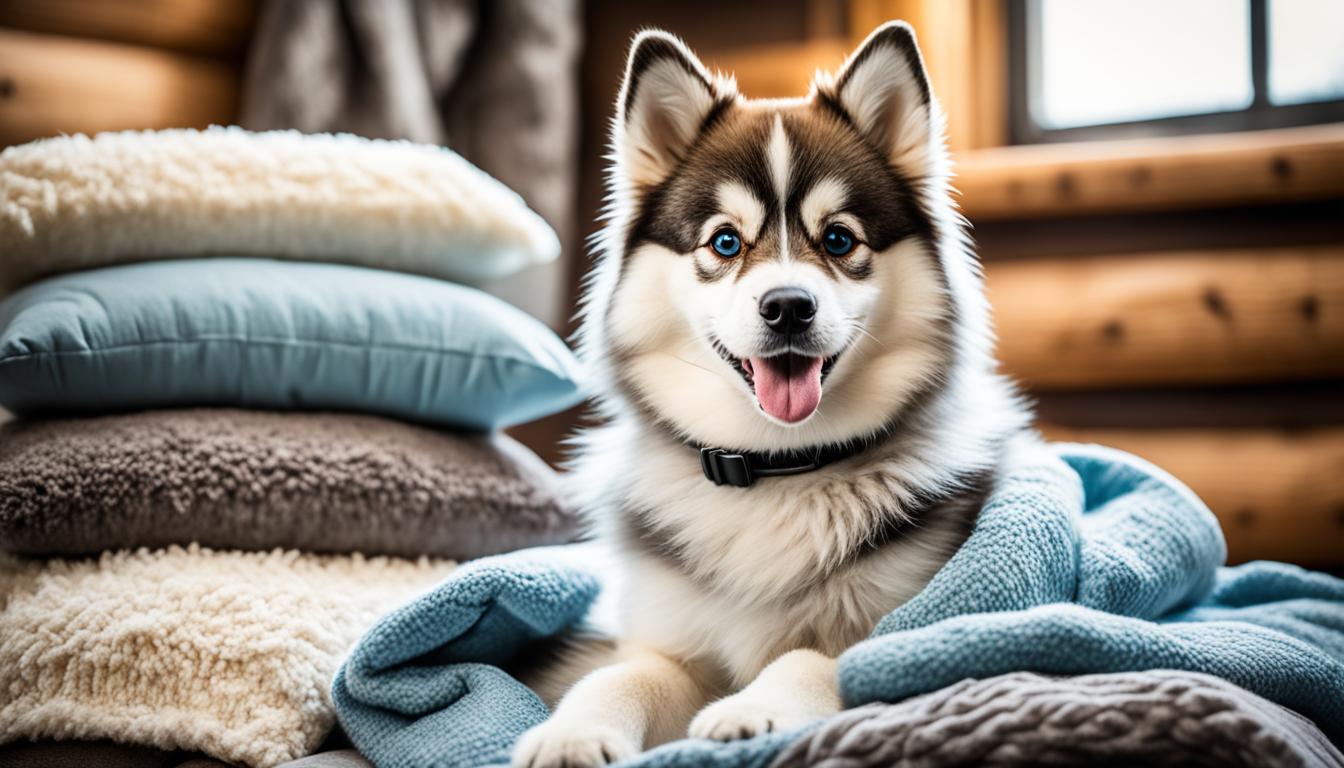When crate training our 8-week-old puppy at night, it is crucial to establish routines that encourage their comfort and good sleeping habits. Placing the crate in a calm location with comfortable bedding, following a consistent bedtime routine, and slowly transitioning to a permanent sleeping area can assist in making the puppy feel secure. Providing timely meals and addressing whining or barking with proper responses are important. With patience, consistency, positive reinforcement techniques, and a peaceful bedtime environment, our puppy will adjust well.
These steps provide a foundation for successful crate training at night.
Key Takeaways
- Establish a consistent bedtime routine with calming activities.
- Feed puppy dinner a few hours before bedtime.
- Place crate near your bed initially for comfort.
- Slowly transition crate to permanent sleeping room.
- Monitor feeding and water schedule to align with bedtime.
Setting Up the Crate Area
When setting up the crate area for your 8-week-old puppy, it's important to choose a quiet location away from high traffic spots in your home. This quiet setting will help create a calm environment for your puppy to feel safe and secure during crate training.
Initially, placing the crate near your bed can provide comfort and reassurance to your puppy, especially during the night when they may feel anxious being away from their littermates for the first time.
Ensure the crate is equipped with comfortable bedding to make the area inviting for your puppy. The bedding should be soft and cozy, encouraging your puppy to view the crate as a pleasant resting place.
Additionally, keeping the crate well-ventilated and at a comfortable temperature is essential for your puppy's well-being. Avoid placing the crate near drafty areas or direct sunlight to maintain a cozy environment that promotes better sleep and relaxation for your puppy during the night.
Establishing Bedtime Routine
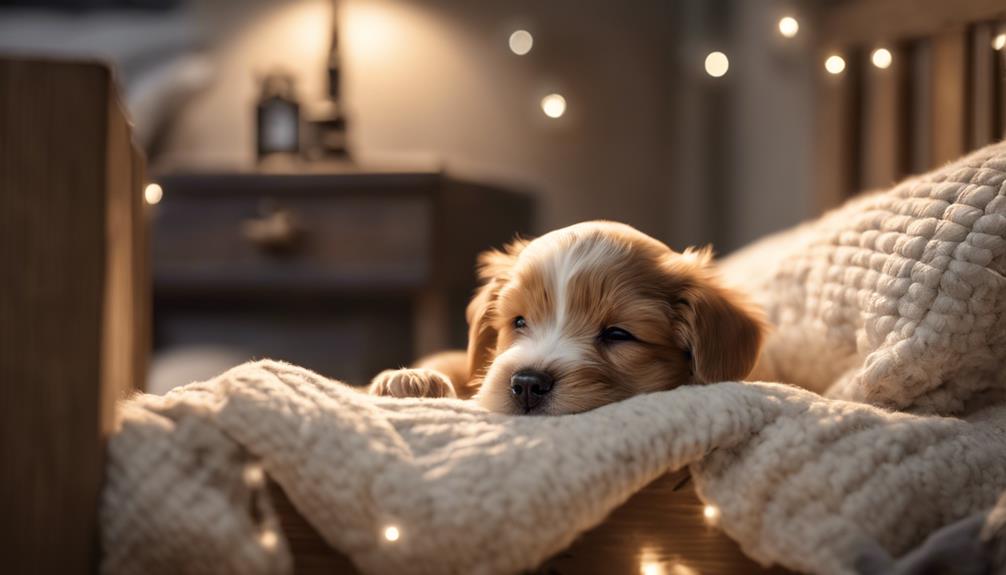
Let's discuss why establishing a bedtime routine is essential for your 8-week-old puppy.
This routine sets the stage for a consistent sleep environment, helping your puppy understand when it's time to rest.
Engaging in calm pre-sleep activities can aid in relaxation and prepare your puppy for a peaceful night's sleep.
Bedtime Routine Importance
Establishing a consistent bedtime routine is essential for helping your 8-week-old puppy understand when it's time to settle down and prepare for sleep. By following a structured routine, your puppy will learn to associate specific activities with bedtime, making the shift smoother. A winding-down routine before crate time can help your puppy relax and get ready to rest. To illustrate the importance of a bedtime routine, consider the following table:
| Activity | Importance |
|---|---|
| Feeding Dinner | Prevents accidents at night |
| Winding-down Routine | Helps puppy relax |
| Setting Consistency | Signals bedtime approaching |
Consistency in your bedtime routine will aid in establishing good sleeping habits for your puppy.
Consistent Sleep Environment
To guarantee a peaceful and restful night for your 8-week-old puppy, maintaining a consistent bedtime routine is crucial. A structured bedtime routine helps establish a consistent sleep environment for your puppy.
Make sure that your puppy's feeding schedule includes dinner a few hours before bedtime to regulate digestion and reduce the likelihood of nighttime accidents. It's important to limit water intake before curfew to minimize the need for potty breaks during the night.
Before crate time, implement calming activities to signal to your puppy that it's time to wind down and sleep. By following a predictable routine every night, you can establish a stable and secure environment that supports your puppy's crate training and overall potty training progress.
Calm Pre-Sleep Activities
Implementing calming pre-sleep activities is essential for establishing a bedtime routine that signals to your 8-week-old puppy it's time to wind down for the night. To set the stage for a restful sleep, consider feeding dinner a few hours before bedtime to prevent late-night potty breaks and accidents in the crate.
Limiting water intake before the curfew helps regulate the puppy's bladder and reduces nighttime accidents. Engage in consistent winding-down activities to create a predictable routine that prepares your puppy for a peaceful night's sleep.
Transitioning to Permanent Sleeping Room

When moving your 8-week-old puppy to their permanent sleeping space, we must carefully consider selecting the right room, bedding, and comfort level.
Ensuring the puppy feels secure and safe in this new setting is essential for a peaceful night's rest. By following a gradual adjustment process and maintaining a consistent bedtime routine, the puppy can adapt comfortably to their designated sleeping area.
Choosing the Right Room
Placing the crate in the assigned sleeping room establishes a stable sleeping environment for your 8-week-old puppy as you shift to their permanent sleeping space. This step is vital in crate training, particularly in a new home, as it helps the puppy recognize their secure space within the sleeping room.
By ensuring the crate remains consistent in this new location, you're assisting the puppy in adapting to the routine and signaling bedtime. Familiarity with the surroundings is essential, and having the crate in the designated sleeping area provides a sense of security for your puppy.
This consistent placement will help your puppy feel settled and comfortable in their new sleeping room, promoting a smoother shift during crate training.
Bedding and Comfort
As we shift the focus to bedding and comfort for your 8-week-old puppy's crate training, ensuring a gradual adjustment to the permanent sleeping room is key. Moving the crate to the puppy's permanent sleeping space can help cultivate a sense of independence and security. It is essential to shift the puppy's bedding and comfort items to the new sleeping area to maintain familiarity. By incorporating a consistent bedtime routine, the puppy can better adapt to the new surroundings. Providing a comfortable and familiar environment will aid in the puppy feeling secure and at ease in the new sleeping space. Below is a table highlighting the importance of bedding and comfort items during this adjustment:
| Aspect | Importance |
|---|---|
| Familiar Bedding | Comfort and Security |
| Consistent Routine | Establishing Stability |
| Adjustment Process | Gradual Adaptation |
| Sense of Independence | Feeling Secure |
| Permanent Sleeping Room | Long-term Comfort |
Gradual Adjustment Process
To ease your 8-week-old puppy's move to their permanent sleeping room, gradually shifting the crate away from your bed is a recommended first step. This adjustment process allows the puppy to become familiar with their new sleeping environment while still feeling connected to you.
As you shift the puppy, provide reassurance by resting your fingers inside the crate to offer comfort. It's crucial to maintain a consistent bedtime routine to help the puppy associate crate time with rest.
Monitor the puppy's behavior closely during this change period to make any necessary adjustments and make sure they feel secure in their new sleeping space.
Feeding and Water Schedule
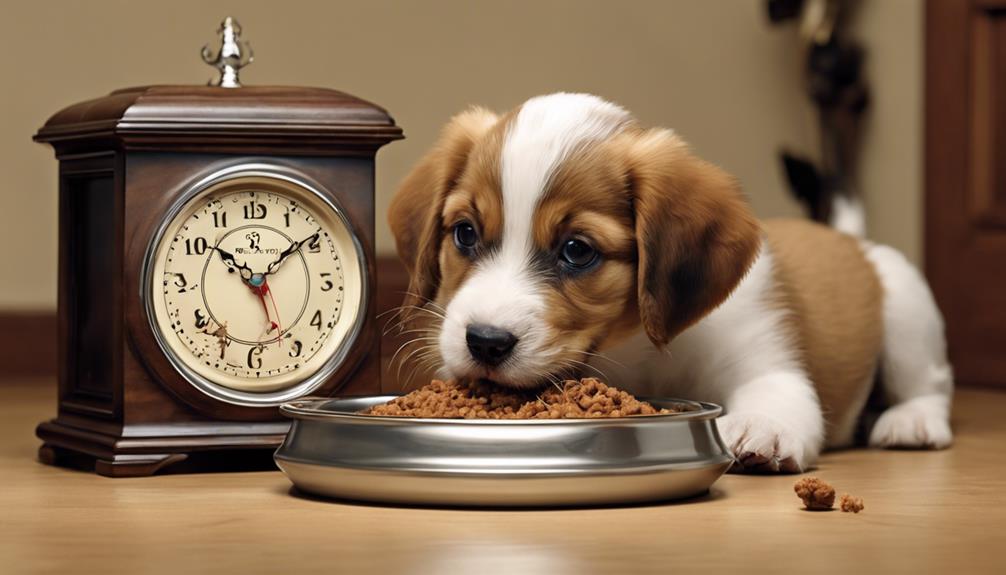
For best growth and development, an 8-week-old puppy should be fed 3-4 times a day while also having access to fresh water throughout, with controlled intake before bedtime to prevent accidents. Establishing a feeding schedule aligned with potty breaks aids in routine development and helps prevent accidents.
Here are key points to ponder for your puppy's feeding and water schedule:
- Feeding Times: Plan meals around your puppy's bathroom schedule to create a routine. This helps regulate their system and minimizes accidents indoors.
- Water Intake: Provide constant access to fresh water during the day but limit intake closer to bedtime. This reduces the likelihood of overnight accidents.
- Nutrient Monitoring: Keep an eye on your puppy's eating habits to make sure they're receiving the necessary nutrients for their growth and well-being.
Adjust the feeding and water schedules based on your puppy's individual needs and reactions to optimize their development.
Handling Whining and Barking

When addressing whining and barking during nightly crate training for an 8-week-old puppy, it's important to understand the reasons behind these behaviors and respond appropriately.
Whining and barking are common when a puppy is adjusting to the crate. It's vital to differentiate between whining because the puppy needs to go potty and whining for attention.
Prompt and consistent responses to the puppy's whining help establish a routine, teaching the puppy when it's time to settle down. Consistency is key in handling whining and barking.
By responding consistently, the puppy learns that whining and barking won't lead to being let out of the crate. This helps the puppy understand that the crate is a safe space for rest and relaxation.
Establishing a routine and sticking to it with patience and consistency will aid in the successful crate training of your puppy.
Patience and Consistency

How can we guarantee that our 8-week-old puppy grasps the importance of patience and consistency in their nightly crate training routine? To ensure successful crate training, we must focus on these key aspects:
- Consistent Routine: Establish a fixed nighttime routine for your puppy, including feeding, playtime, and potty breaks. Consistency helps your puppy understand when it's time to settle down for the night.
- Patience and Understanding: Remember that your puppy is still adjusting to their new environment and may need time to feel comfortable sleeping in the crate. Be patient and provide reassurance during this adjustment period.
- Gradual Shift: Slowly acclimate your puppy to sleeping independently in the crate. Start by placing the crate near your bed so they can hear and smell you. Over time, move the crate to its designated spot while ensuring your puppy remains calm and secure.
Positive Reinforcement Techniques

To enhance your 8-week-old puppy's crate training experience, incorporating positive reinforcement techniques can greatly bolster their understanding and compliance with desired behaviors. During crate training sessions, using high-value treats and praise as rewards for positive behavior is essential.
Rewarding your puppy immediately after they eliminate outside the crate helps them associate the action with positive reinforcement, encouraging them to repeat the behavior. Consistent praise and rewards play a significant role in helping the puppy understand what behaviors are desirable while in the crate.
These positive reinforcement techniques not only aid in crate training but also create a strong bond between the puppy and the owner during the training process. Additionally, incorporating verbal cues such as 'good job' or 'well done' along with treats reinforces positive behavior consistently, reinforcing the connection between the action and the reward.
Ensuring a Peaceful Nights Sleep
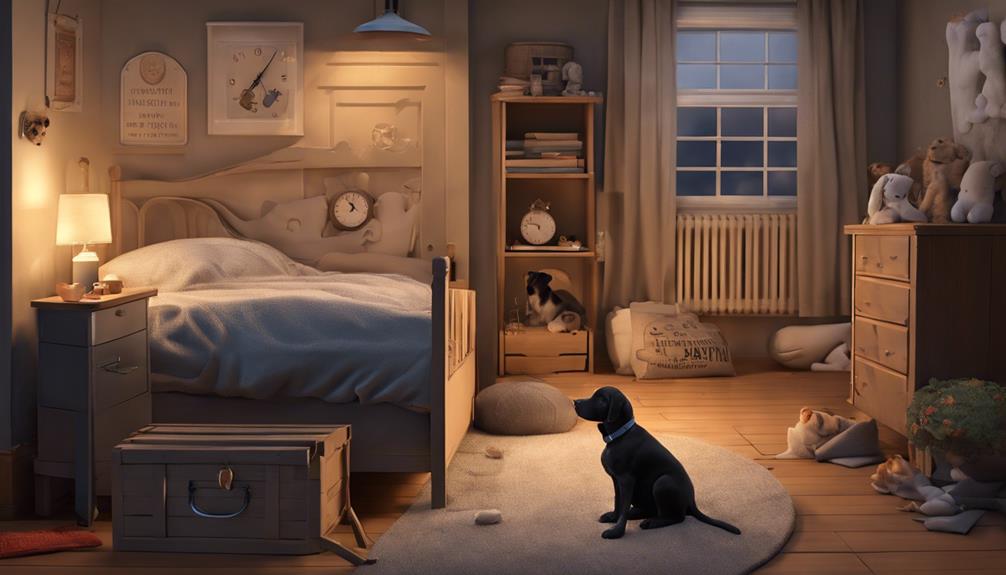
Establishing a consistent bedtime routine for your 8-week-old puppy is crucial in ensuring a peaceful night's rest. To achieve this, consider the following steps:
- Monitor Behavior: Pay attention to your puppy's reactions to the bedtime routine. Adjust the schedule if needed to suit their comfort and development, ensuring a smooth shift to sleeping independently in the crate.
- Bedtime Routine: Create a calming ritual before bedtime, such as a brief walk or playtime followed by a quiet period. This signals to your puppy that it's time to wind down and prepare for sleep.
- Move to Independence: Initially, place the crate next to your bed to provide a sense of security for your puppy. As they become more accustomed to the crate, gradually relocate it to its permanent spot. This gradual change helps the puppy feel secure and promotes a peaceful night's sleep.
Frequently Asked Questions
How Do You Crate Train an 8 Week Old Puppy at Night?
We create a cozy crate near our bed for our 8-week-old puppy at night. Slowly move it further away to encourage independence. Establish a bedtime routine, limit food/water, and monitor behavior for adjustments.
How Many Hours Should 8 Week Old Puppy Be in Crate?
We guarantee our 8-week-old puppy is crated for no more than 2 hours at a time. It's crucial to provide frequent potty breaks due to limited bladder control. As the puppy grows, we gradually increase crating time.
What Can I Do With My 8 Week Old Puppy at Night?
At night with our 8-week-old puppy, we focus on establishing a calming routine, ensuring they use the bathroom before bedtime, creating a cozy crate environment, and monitoring their needs promptly. These steps help promote a peaceful night for all.
How Long Can a 10 Week Old Puppy Stay in a Crate at Night?
We can typically expect a 10-week-old puppy to handle 4 to 5 hours in a crate at night. Regular potty breaks are a must. Gradually extend crate time, adjusting based on behavior. Consistent routine promotes security and aids in training.
Can the Nightly Crate Training Schedule for an 8-Week-Old Puppy be Applied to a 16-Week-Old Puppy?
Yes, the crate training schedule for a puppy can be applied to a 16-week-old puppy. At 16 weeks, a puppy can hold its bladder for around 4 hours, so you can adjust the schedule accordingly. Remember to be patient and consistent with the training.
Conclusion
To guarantee a successful and peaceful nightly crate training schedule for your 8-week-old puppy, remember that consistency is key. Just like a well-oiled machine, sticking to a routine will help your furry friend feel safe and secure in their new environment.
With patience and positive reinforcement, you'll be able to create a harmonious bedtime routine that sets both you and your puppy up for a restful night's sleep. So keep at it, and soon enough, your pup will be crate trained like a pro.

